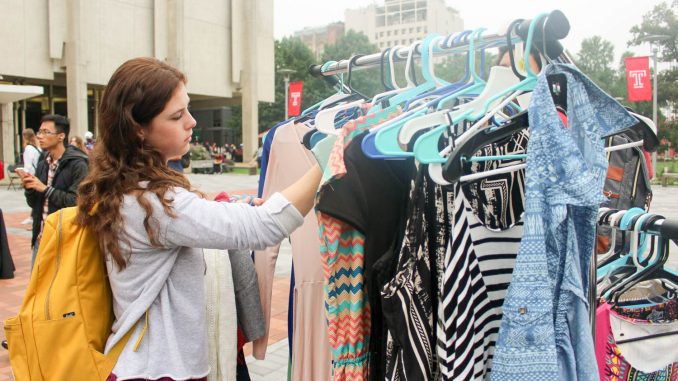
On a humid, muggy Wednesday morning, students rummaged through piles of jeans, dresses and shirts at a pop-up thrift store by the Bell Tower.
It was the first of three Pop-up Thrift shops happening on Main Campus this semester as part of Temple University’s Give + Go Green program, a residential recycling program sponsored by the Office of Sustainability and University Housing and Residential Life.
The event sells clothing students in residence halls donated to Give + Go Green at the end of last school year. Proceeds from the sale are given to the Cherry Pantry, which provides food for students experiencing food insecurity.
“It’s really guilt-free shopping,” said Kathleen Grady, Temple’s director of sustainability. “If you think about it, you’re buying something that has almost zero carbon footprint, you’re cutting the other environmental impacts because it’s already recycled fashion and all the money is going to help out fellow students.”
The shop offers a range of casual clothing, sports apparel, professional wear and seasonal gear.
To purchase items, students must sign a waiver stating that they understand that there are no returns on items, and then buy tickets which they can exchange for clothing at a rate of $1 to one ticket. Most of the pieces cost $3, and none cost more than $10.
Hailey Quillen-Knox, a freshman journalism and political science major, said she appreciates the convenience of affordable items being easily accessible on campus.
“It’s a good resource for students here, especially for students with financial aid issues,” she said. “It’s pretty nice to have available in such a big city.”
In Spring 2018, Give + Go Green placed donation bins in residence halls during move-out week. They received such an overwhelming amount of clothes and food that it took more than two weeks for student and staff volunteers to sort more than 200 pallet-sized boxes of donations, which set a record.
“The sorting process was the most difficult aspect of the entire event,” said Connor Caruso, a junior environmental studies major and sustainability outreach assistant at the Office of Sustainability.
Volunteers would categorize items by determining if it was something “worthy of a student spending their money on,” asking if it was something appropriate to sell to students.
After sorting, 3,000 pounds of non-perishable food was donated to the Cherry Pantry, 1,000 pounds of office supplies were donated to Temple’s Office Supply Swap and 250 pounds of computers, old phones, flash drives, and printers were donated to Temple’s Computer Recycling Center.
Grady said a tractor-trailer full of clothing – weighing about 2,300 pounds – was immediately donated to Goodwill, with 5,050 pounds of clothing left for sale on campus.
Before starting the Pop-Up Thrift initiative, the Give + Go Green program directly donated students’ leftover items to collection and community recycling centers.
“We decided that students aren’t really seeing the connection when we just collect the donations,” Grady said. “They don’t know the amount of material left behind, they don’t see what happens to the material.”
The first Pop-Up Thrift took place in 2016 after a group of students approached the Office of Sustainability with the idea. The sale that year raised $1,100, which was donated to nonprofit Lambi Fund in Haiti to support the island’s Hurricane Matthew victims.
In 2017, Give + Go Green set to increase the impact of its sales by contributing food items to help stock the Cherry Pantry, which opened in February.
“There was no better cause on campus,” Caruso said of combining efforts to give back to the student population.
Three Pop-Up Thrift events were hosted in Fall 2017, from which $4,600 were raised and donated to Cherry Pantry.
Last year’s sale turnout led the Give + Go Green program to receive the Daniel G. Weisenbach Environmental Stewardship Award from the Professional Recyclers of Pennsylvania. The award recognizes recycling projects for innovative and trend-setting ideas that harness unique relationships.
Grady said the Pop-Up Thrift initiative is a “demonstration of recycling in action,” and it shows students the importance of environmental equity in community connections.
“We’re working towards building a more resilient Temple, and a more resilient Philadelphia,” she said. “We’re all in this together.”


Be the first to comment